For any law firm, one missed deadline can cost a client—and hard-earned reputation. If you ask me the reason, I would say that too many firms still rely on spreadsheets, sticky notes, or scattered emails, hoping nothing gets overlooked.
But the truth is, when you’re handling dozens of cases and client demands at once, things do get overlooked. Details slip, follow-ups get missed, and stress builds fast. That’s why having the right CRM for a law firm isn’t just a convenience — it’s protection against costly mistakes.
I’ve tested a range of legal CRM systems over the years, and some stood out more than others. In this blog, I’ll share the 7 best CRM tools, so you can choose the one that keeps your practice sharp and your clients confident.
What Is a CRM for Law Firms?
A CRM for law firms is software that helps attorneys and staff manage client relationships and daily workflows from one place. Instead of switching between spreadsheets, emails, and paper files, a legal CRM keeps everything together — client details, case documents, deadlines, and billing.
The key difference from regular CRMs is that a legal CRM system is built with law practices in mind. It goes beyond tracking contacts to support things like e-signatures, secure document storage, compliance checks, and even case pipelines. This makes it easier to stay organized and protect sensitive client information.
With a CRM for legal firms, you save time and reduce stress. The system integrates with your email, calendar, and billing tools, so you don’t miss important updates or deadlines. In short, it keeps your practice running smoothly and lets you focus more on clients instead of paperwork.
Legal CRM vs. General CRM vs. Practice Management
It’s easy to confuse CRM for legal firms with general CRMs or legal practice management tools. Here’s the difference:
- General CRM: Focused on sales pipelines, lead management, and marketing automation.
- Practice Management Software: Manages case files, docketing, timekeeping, and billing.
- Legal CRM Solutions: Combines both worlds — client intake, case communication, billing, compliance, and marketing.
For law firms, the legal CRM system bridges the gap, ensuring you don’t have to juggle multiple tools.
7 Best CRM for Law Firms
Here’s my first-hand experience using some of the best CRM for legal firms. I’ve listed what each tool is best for, how it works in real practice, and its pros, cons, and pricing.
| Tools | Best for | Pricing |
|---|---|---|
| BIGContacts | Contact Management & Email Marketing for Small & Medium Businesses | Forever free for small teams. Paid starts at $9.99/month |
| Clio | Comprehensive Practice Management | Starts at $39/user/month |
| MyCase | Client Communication | Starts at $39/user/month |
| PracticePanther | Workflow Automation | Starts at $39/user/month |
| Zoho CRM | Budget-friendly CRM for small firms | Starts at $14/user/month |
| Lawmatics | Marketing Automation | Starts at $199/month |
| Rocket Matter | Billing & Time Tracking | Starts at $39/user/month |
1. BIGContacts – Best for Contact Management & Email Marketing for Small & Medium Businesses
I used BIGContacts to organize my client database, and it completely streamlined how I managed cases. The platform gave me a clear, real-time view of all client communications, documents, and tasks. Unlike other CRMs I tried, it didn’t overwhelm me with unnecessary features.
When I started setting reminders for court dates and deadlines, BIGContacts’ automation saved me hours. The dashboard felt intuitive — I could log interactions, set follow-ups, and generate case-related reports in just a few clicks.
The best part was email and calendar integration. I synced it with Outlook, and suddenly all my client interactions were in one place. This helped me avoid miscommunications and ensured compliance with record-keeping standards.
Pros:
- Automation for routine tasks helps law firms save valuable time and reduce manual effort.
- Strong integration with Dropbox, QuickBooks, and Google Drive to ensure seamless access to files and financial data
- Customizable workflows and pipelines that match the firm’s unique processes and case stages
- The system includes comprehensive billing and invoicing tools, making it easier to track payments and manage finances
Cons:
- No downloadable or on-premise version
- Dark user interface option not available
Pricing:
Forever free for small teams. Paid starts at $9.99/month.
2. Clio – Best for Comprehensive Practice Management
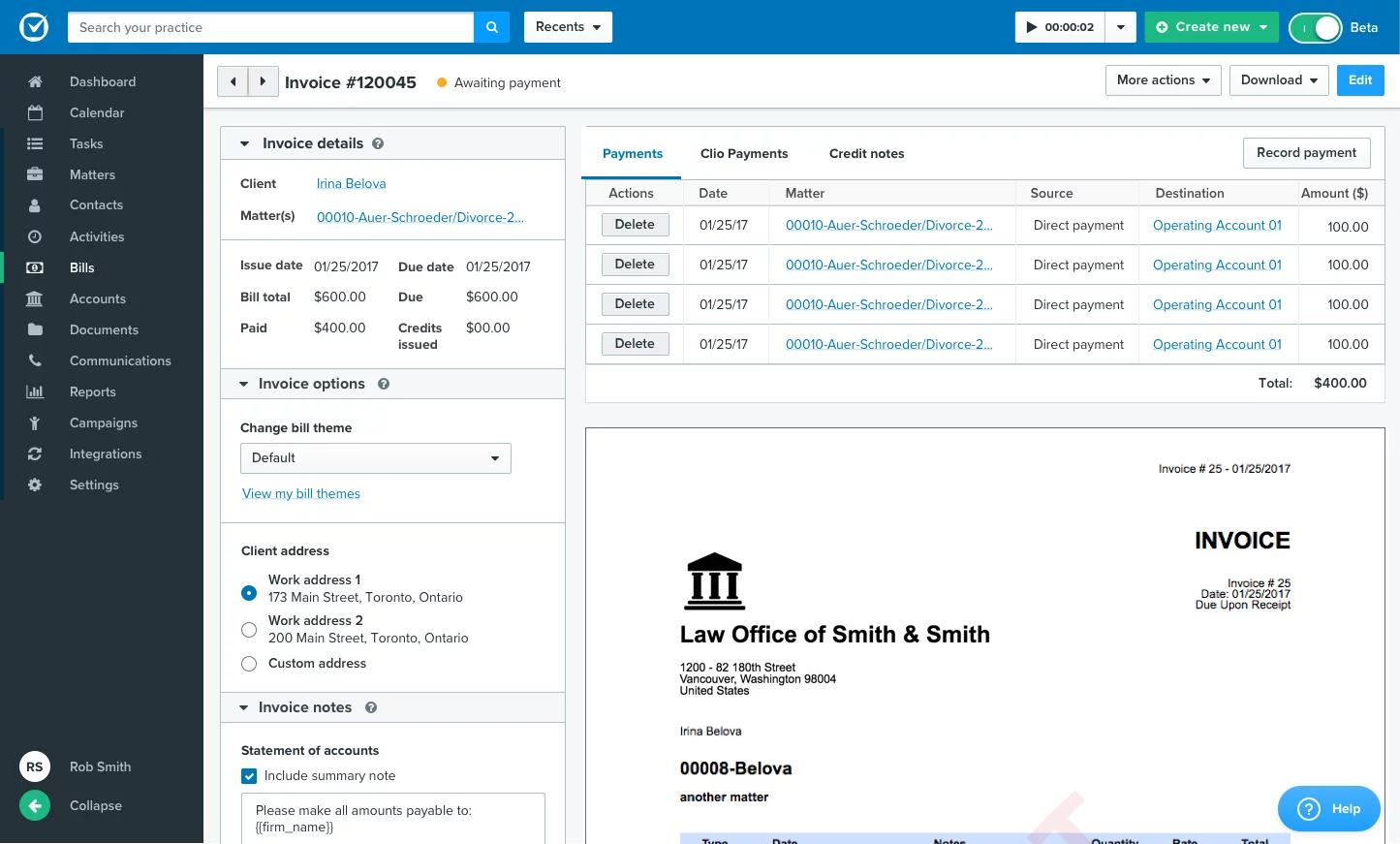
Image source: LawSites
Clio impressed me right away because it felt like a tool designed from the ground up for legal professionals. Unlike generic CRMs that require heavy customization, Clio came with built-in features that aligned perfectly with a law firm’s daily needs, from managing matters to tracking billable hours.
When I used it for time tracking, the improvement in accuracy was immediate — no more second-guessing or scrambling to log hours. The client intake process also became smoother, and I appreciated how easily it connected with QuickBooks to keep finances in order.
That said, Clio is a feature-rich platform, and it did take some time to get my staff fully comfortable with it. Once we got through the learning curve, though, it became the central hub for managing clients, cases, and billing in one place.
Pros:
- Strong case and matter management capabilities to ensure every client file and task stays organized.
- Integrated billing and time tracking make it easier to log hours and generate accurate invoices
- Secure document storage and sharing
- Provides a large library of third-party integrations, extending its functionality across other tools.
Cons:
- The platform has a steeper learning curve for beginners due to its wide range of features.
- Pricing can become higher for firms that need advanced functionality.
Pricing:
Starts at $39/user/month.
3. MyCase – Best for Client Communication
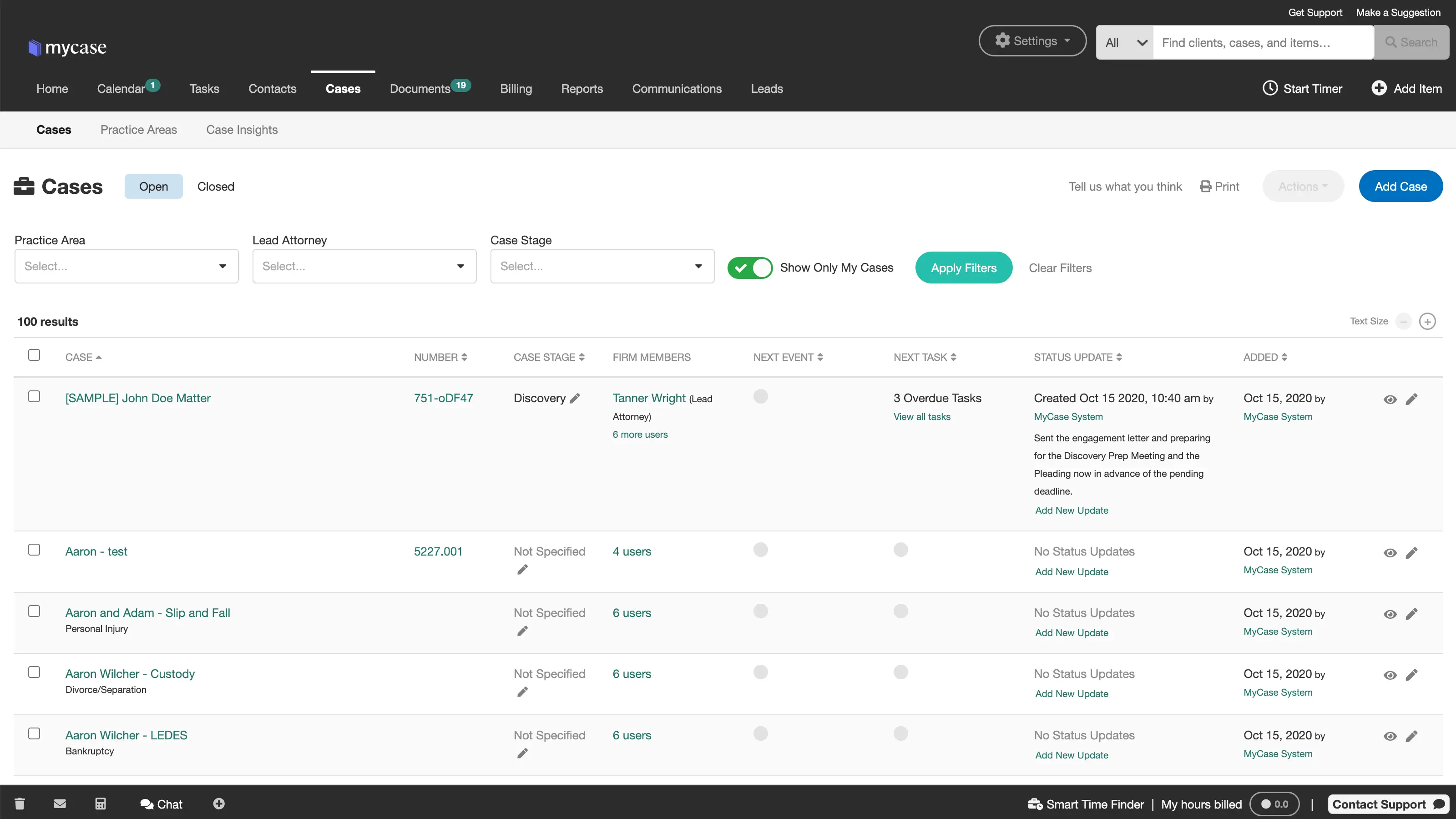
Image source: Capterra
MyCase stood out to me for one key reason: it made communication with clients feel effortless. The secure client portal was a game-changer — instead of back-and-forth emails, I could share documents and updates directly, giving clients peace of mind.
Task management also became much easier. Assigning case-related tasks and tracking their progress felt straightforward, and having invoicing built into the system saved a lot of time.
The downside I noticed was that customization options were limited. Still, for firms that value clear, secure, and reliable communication with clients, MyCase delivered exactly what I needed.
Pros:
- A secure client portal to make it simple to share documents and updates
- Task and workflow management tools help lawyers stay organized and efficient
- Integrated billing and invoicing streamline financial operations
- Built-in document management and e-signature features improve client service
Cons:
- Customization options are somewhat limited.
- Reporting features could be more advanced.
Pricing:
Starts at $49/user/month.
4. PracticePanther – Best for Workflow Automation

Image source: PracticePanther
What impressed me about PracticePanther was how much it automated without me even realizing it. From client intake to contract reminders, so many repetitive tasks ran in the background while I focused on more important work.
I particularly liked how it connected with Dropbox and Google Drive. Sharing and accessing documents across my team became seamless, and QuickBooks integration kept billing in sync.
The only challenge was that it felt overwhelming at the start because of the number of features available. But once I had customized it, the automation made my workflows smooth and predictable.
Pros:
- PracticePanther automates repetitive tasks, reducing manual workload
- Integrates seamlessly with Dropbox, QuickBooks, and Google Drive
- Customizable workflows and pipelines adapt to each firm’s processes
- Billing and invoicing features are comprehensive and easy to manage
Cons:
- Initial setup can feel overwhelming.
- Advanced features increase the overall cost.
Pricing:
Starts at $39/user/month.
5. Zoho CRM – Best for Small Firms on a Budget
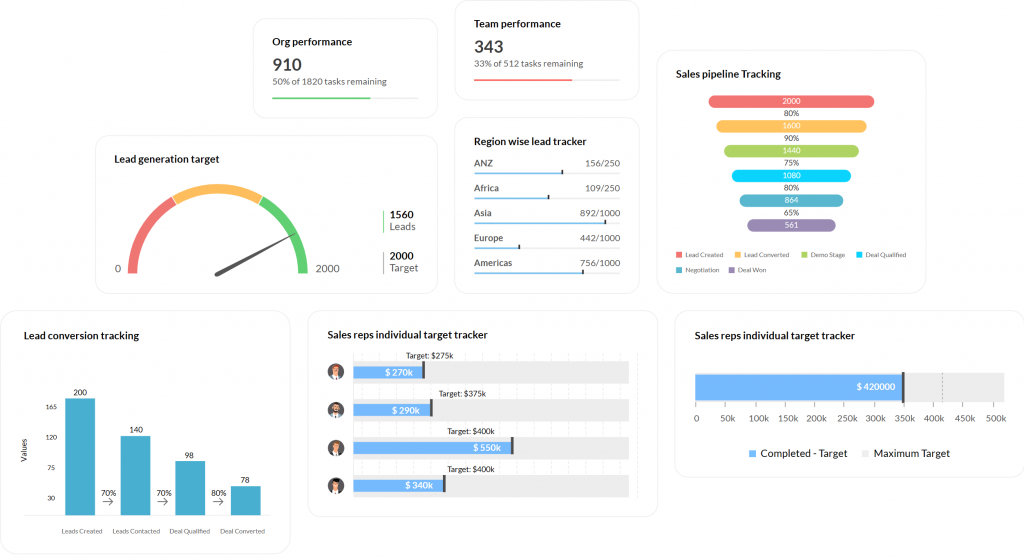
Image source: Zoho
Zoho CRM surprised me with how flexible it was for a general CRM. Even though it wasn’t built just for law firms, I was able to customize fields and workflows to match case management needs.
The AI assistant helped flag clients who needed follow-ups, which made my client outreach more proactive. I also liked that I could scale features up as my needs grew without having to switch platforms.
The trade-off, of course, was that legal-specific features like document templates and billing had to be handled separately. Still, for a cost-effective entry point, Zoho delivered solid value.
Pros:
- Zoho CRM is affordable, with a free plan available for small teams.
- Customizable fields and workflows adapt to different practice areas.
- AI-driven insights help prioritize client follow-ups.
- Automation features simplify repetitive administrative tasks.
- Wide range of integrations supports growing firms.
- The platform scales easily as the firm expands
Cons:
- It is not designed exclusively for law firms.
- Some advanced features require higher-tier plans.
Pricing:
Starts at $14/user/month.
6. Lawmatics – Best for Marketing Automation
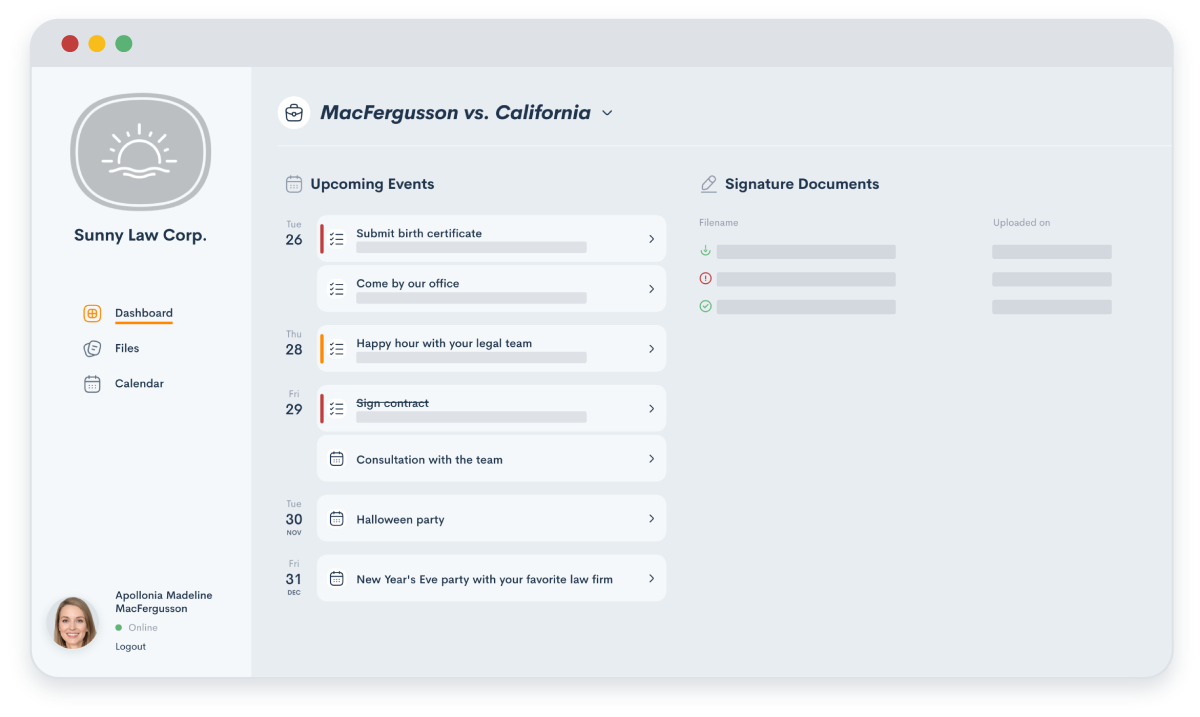
Image source: Lawmatics
Lawmatics quickly became my go-to tool for handling client acquisition. The intake forms felt professional and easy to set up, and drip email campaigns allowed me to keep prospects engaged without constant manual effort.
The analytics dashboard was another highlight, giving me a clear view of which marketing efforts were paying off. I could measure ROI on campaigns and refine strategies based on data.
The main drawback I noticed was that the interface took time to learn. But once I got comfortable, it became a powerful asset for marketing and intake automation.
Pros:
- Email and drip campaigns to help nurture prospects effectively
- Online intake forms to simplify client onboarding
- Analytics to provide clear visibility into marketing performance
- Workflow automation to build consistent client journeys
Cons:
- The interface has a steeper learning curve.
- Pricing may be high for smaller firms.
Pricing:
Starts at $199/month.
7. Rocket Matter – Best for Billing & Time Tracking
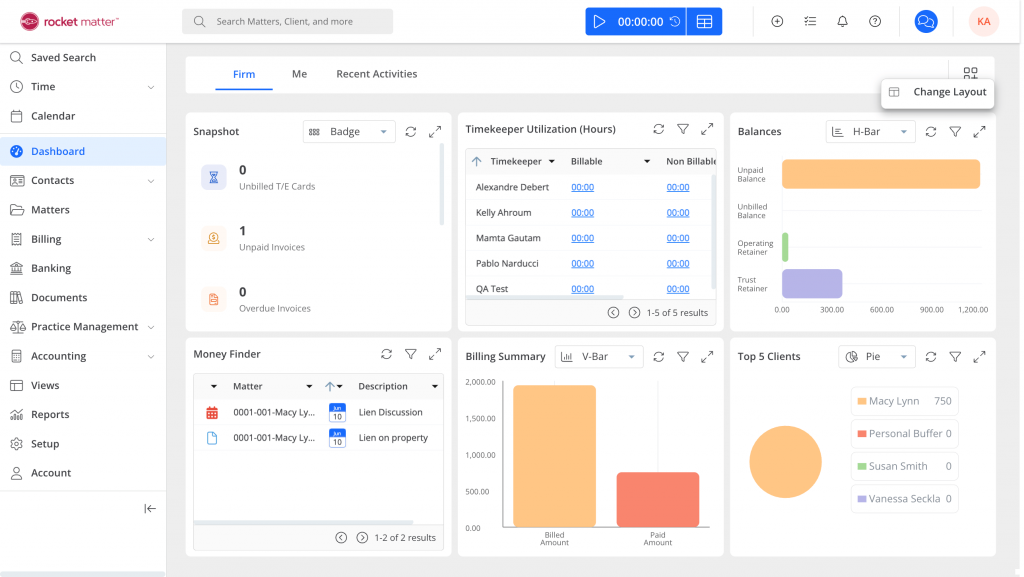
Image source: Rocket Matter
Rocket Matter impressed me with how much easier billing became once I started using it. I could log hours directly from emails and calendar events, which made invoicing far less stressful and more accurate.
For larger cases, the project management features helped me keep tasks and team assignments organized. The mobile app also proved handy for tracking hours when I was away from the office.
The reporting wasn’t as detailed as some competitors, but for firms that rely heavily on billing accuracy, Rocket Matter more than made up for it.
Pros:
- Project and task management tools to support collaboration on larger cases
- Secure cloud-based storage to protect client files
- The mobile app makes case management and time tracking accessible on the go
- Integrations with QuickBooks and Dropbox enhance functionality
Cons:
- Reporting features are less advanced than those of some competitors
- The user interface looks slightly dated compared to modern CRMs
Pricing:
Starts at $39/user/month.
How to Choose a CRM for Your Law Firm
Picking the right CRM for law firms isn’t about grabbing the most popular tool — it’s about finding the one that fits your practice best. Here are the key things to look for:
1. Contact & Client Management
Your CRM should act as a single source of truth for all client details, from basic contact information to detailed case notes. This ensures your team can quickly access a client’s history whenever needed.
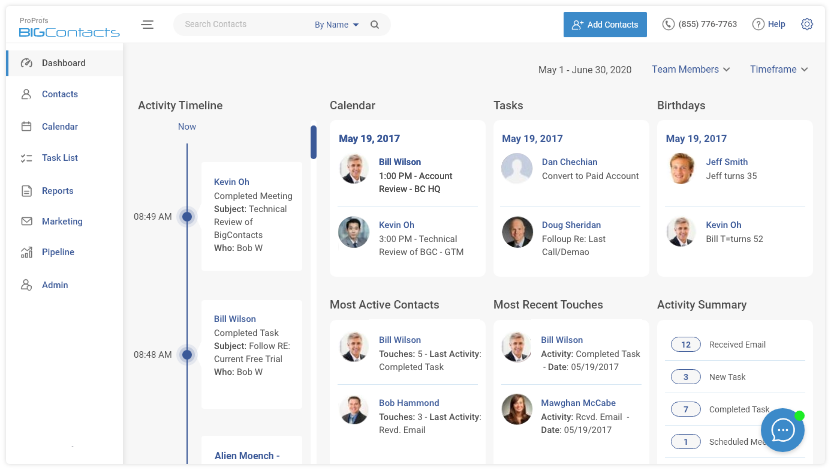
2. Secure Document Handling With E-Signature Support
Since law firms deal with sensitive documents, your CRM must store files securely, allow safe sharing, and offer built-in e-signature options to keep everything compliant and convenient.
3. Calendar and Email Integration
Choose a CRM that connects with Outlook or Google Workspace so your deadlines, appointments, and client communications automatically sync — no more missed dates or lost emails.
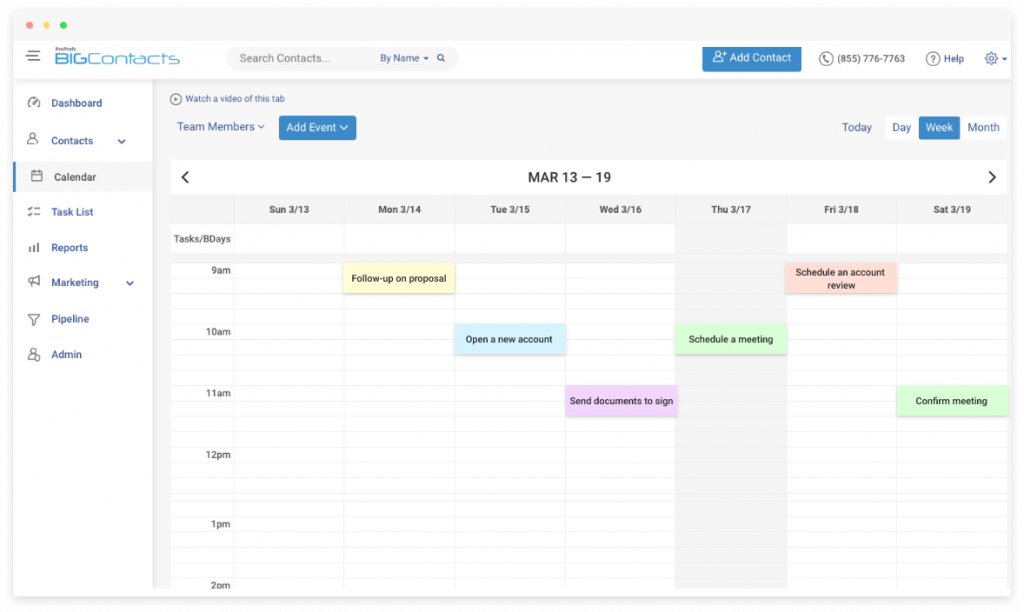
4. Task and Workflow Automation
A good CRM takes repetitive work off your plate. Features like automatic reminders, follow-up prompts, and task assignments keep your team organized without constant manual effort.
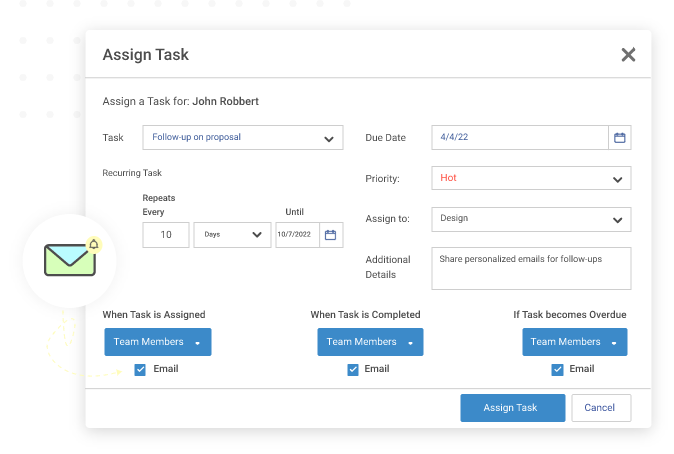
5. Billing, Time Tracking, and Accounting Integrations
For most firms, billable hours are everything. Look for a CRM that makes time tracking simple and links directly with tools like QuickBooks for easy invoicing and financial management.
6. Compliance Features (GDPR, HIPAA, CMMC, etc.)
Confidentiality is critical. Your CRM should offer compliance safeguards such as encryption, role-based access, and audit trails to protect sensitive client data.
7. Strong Reporting and Analytics
You can’t improve what you don’t measure. A CRM with clear reports and dashboards helps you track performance, measure revenue, and make better business decisions.
Grab the Best Legal CRM to Streamline Your Practice
At the end of the day, the best CRM for law firms is the one that fits your goals and workflows. Some firms need a simple tool to centralize client details, while others look for a full suite covering case management, billing, and marketing. That’s why weighing your priorities before deciding is so important.
If simplicity is key, BIGContacts is a great choice for small and mid-sized firms. For comprehensive practice management, Clio stands out. If billing accuracy is your focus, Rocket Matter is a solid fit, while Lawmatics excels in marketing and client acquisition.
Whichever path you choose, the right legal CRM system will keep your firm organized, protect client data, and strengthen relationships. And if you’re just exploring, BIGContacts offers a forever-free plan—making it an easy place to start without any pressure.
Frequently Asked Questions
Do legal CRMs support billing and time tracking?
Absolutely. The best legal CRM systems include time tracking and connect with tools like QuickBooks to make billing accurate and simplify invoicing.
Will a CRM help my law firm scale?
Yes. The right legal CRM streamlines operations, automates repetitive tasks, and centralizes data—allowing your firm to grow without sacrificing organization or service quality.
Why does a legal CRM need e-signature support?
E-signature makes document signing faster, secure, and paper-free. It helps law firms get contracts signed efficiently while maintaining compliant and verifiable records.
Can a CRM integrate with email and calendars?
Yes. A good legal CRM syncs with Outlook or Google Calendar so appointments, deadlines, and email threads automatically update, reducing missed communications.
FREE. All Features. FOREVER!
Try our Forever FREE account with all premium features!








